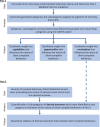Factors influencing the nature of client complaint behaviour in the aftermath of adverse events
- PMID: 39734268
- PMCID: PMC11907750
- DOI: 10.1002/vetr.4966
Factors influencing the nature of client complaint behaviour in the aftermath of adverse events
Abstract
Background: Negative veterinary client complaint behaviour poses wellbeing and reputational risks. Adverse events are one source of complaint. Identifying factors that influence adverse event-related complaint behaviour is key to mitigating detrimental consequences and harnessing information that can be used to improve service quality, patient safety and business sustainability.
Methods: Interviews were conducted with five veterinary client complainants and five veterinary client mediators. Qualitative content analysis of the transcripts was used to identify categories of capability, opportunity and motivation influencing client behaviour. One category of motivation identified focused on the desired outcomes of complainants. Two hundred and eighty resolved veterinary‒client mediation cases related to adverse events subsequently underwent content analysis to quantify these desired outcomes.
Results: Client complaint behaviour was motivated by clients' emotional reactions, perceptions and beliefs and desire to achieve an outcome as a result, and was influenced by previous complaint experience, technological ability, self-confidence and broader organisational and societal factors. Although financial redress was the most commonly identified desired outcome, apology, honesty, accountability and prevention of future events were valued.
Limitations: Small data sets and interpretative analyses limit the generalisability of the findings.
Conclusions: Proactively engaging clients in relation to adverse events is likely to reduce negative complaint behaviour and facilitate veterinary quality improvement.
© 2024 The Author(s). Veterinary Record published by John Wiley & Sons Ltd on behalf of British Veterinary Association.
Conflict of interest statement
The authors declare they have no conflicts of interest.
Figures



Similar articles
-
Sexual Harassment and Prevention Training.2024 Mar 29. In: StatPearls [Internet]. Treasure Island (FL): StatPearls Publishing; 2025 Jan–. 2024 Mar 29. In: StatPearls [Internet]. Treasure Island (FL): StatPearls Publishing; 2025 Jan–. PMID: 36508513 Free Books & Documents.
-
Health professionals' experience of teamwork education in acute hospital settings: a systematic review of qualitative literature.JBI Database System Rev Implement Rep. 2016 Apr;14(4):96-137. doi: 10.11124/JBISRIR-2016-1843. JBI Database System Rev Implement Rep. 2016. PMID: 27532314
-
Consumer-providers of care for adult clients of statutory mental health services.Cochrane Database Syst Rev. 2013 Mar 28;2013(3):CD004807. doi: 10.1002/14651858.CD004807.pub2. Cochrane Database Syst Rev. 2013. PMID: 23543537 Free PMC article.
-
Smoking cessation medicines and e-cigarettes: a systematic review, network meta-analysis and cost-effectiveness analysis.Health Technol Assess. 2021 Oct;25(59):1-224. doi: 10.3310/hta25590. Health Technol Assess. 2021. PMID: 34668482
-
Antidepressants for pain management in adults with chronic pain: a network meta-analysis.Health Technol Assess. 2024 Oct;28(62):1-155. doi: 10.3310/MKRT2948. Health Technol Assess. 2024. PMID: 39367772 Free PMC article.
References
-
- Leebov W, Afriat SH, Presha J. Service savvy health care: one goal at a time. iUniverse; 2007.
-
- Etzel MJ, Silverman BI. A managerial perspective on directions for retail customer dissatisfaction research. J Retailing. 1981;57(3):124.
-
- Jacoby J, Jaccard JJ. The sources, meaning, and validity of consumer complaint behavior: a psychological analysis. J Retailing. 1981;57(3):4‒24.
-
- Singh J. A typology of consumer dissatisfaction response styles. J Retailing. 1990;66:57‒99.
Publication types
MeSH terms
Grants and funding
LinkOut - more resources
Full Text Sources

